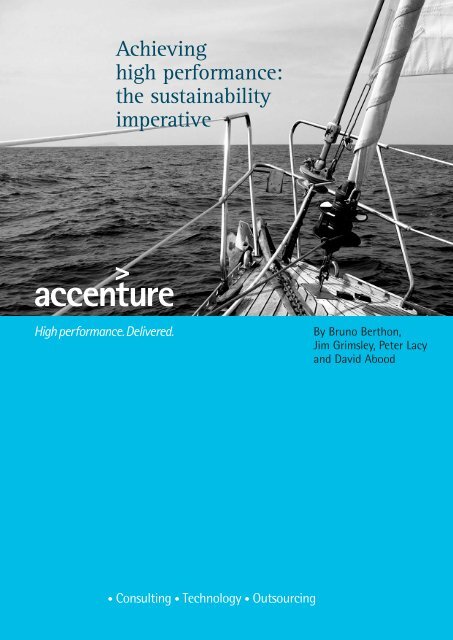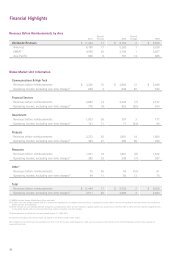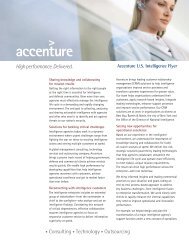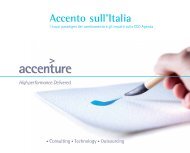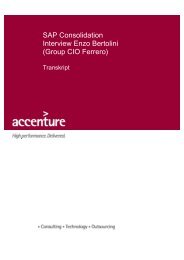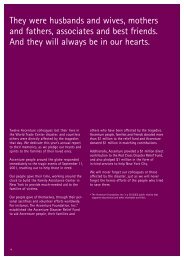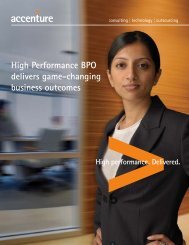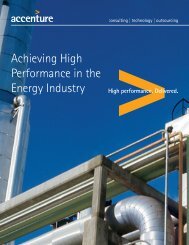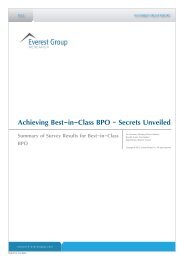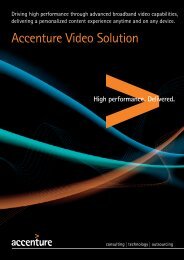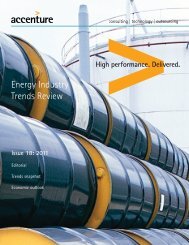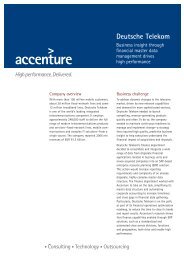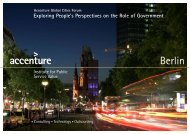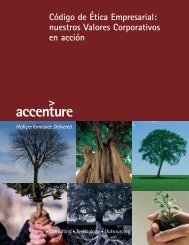Achieving high performance: the sustainability imperative
Achieving high performance: the sustainability imperative
Achieving high performance: the sustainability imperative
Create successful ePaper yourself
Turn your PDF publications into a flip-book with our unique Google optimized e-Paper software.
<strong>Achieving</strong><br />
<strong>high</strong> <strong>performance</strong>:<br />
<strong>the</strong> <strong>sustainability</strong><br />
<strong>imperative</strong><br />
By Bruno Berthon,<br />
Jim Grimsley, Peter Lacy<br />
and David Abood
Confronting fundamental challenges<br />
such as climate change, population<br />
growth, human rights and resource<br />
constraints, businesses and public<br />
sector organizations face a daunting<br />
new <strong>imperative</strong>.<br />
2 <strong>Achieving</strong> <strong>high</strong> <strong>performance</strong>: <strong>the</strong> <strong>sustainability</strong> <strong>imperative</strong>
They must use fewer resources to produce<br />
goods and services that benefit society<br />
and <strong>the</strong> environment and still meet<br />
traditional demands—from customers and<br />
citizens for price, quality and availability;<br />
from shareholders for outstanding<br />
<strong>performance</strong> and returns; and from<br />
politicians for economic growth and<br />
prosperity in both developed and<br />
developing economies.<br />
The <strong>imperative</strong> for sustainable production<br />
and consumption builds on <strong>the</strong> principles<br />
of reduce, reuse and recycle, but it<br />
requires much more than that. It requires<br />
innovative thinking and fundamental<br />
alterations in business models. It requires<br />
making <strong>the</strong> most of fast-changing<br />
regulations, leading-edge technologies<br />
and shifting consumer expectations and<br />
demands. Above all, this new <strong>imperative</strong><br />
requires that <strong>sustainability</strong> be woven into<br />
<strong>the</strong> core strategies of companies and<br />
public sector organizations.<br />
As <strong>sustainability</strong> moves from <strong>the</strong><br />
periphery to <strong>the</strong> heart of business<br />
and <strong>the</strong> public sector, organizations are<br />
finding that it comes with a price and<br />
a prize. The price is <strong>the</strong> fundamental<br />
transformation that fully integrated<br />
<strong>sustainability</strong> requires in <strong>the</strong> face of an<br />
aggressive social, environmental and<br />
economic agenda. The prize, however,<br />
is tantalizing: <strong>the</strong> opportunity for<br />
organizations to outperform <strong>the</strong>ir<br />
peers and achieve <strong>high</strong> <strong>performance</strong>.<br />
So what to do as a top executive?<br />
We believe opportunities abound to<br />
both preserve and create value by<br />
integrating <strong>sustainability</strong> into your<br />
business strategy and operating model.<br />
New and differentiated products and<br />
services can increase revenue and<br />
generate market-leading innovations<br />
and technologies for a renewed path<br />
to profitable growth. Higher resource<br />
efficiency and lower emissions can<br />
reduce cost. Proactive responses<br />
can better manage regulatory and<br />
operational risk. Toge<strong>the</strong>r <strong>the</strong>se<br />
opportunities also can build <strong>the</strong><br />
intangible—and invaluable—assets<br />
of brand and reputation.<br />
Sustainability defined<br />
Sustainability affects all industries and<br />
governments. Issues encompass an<br />
integrated agenda of environmental,<br />
social and economic impact—sometimes<br />
referred to as “planet, people and profit.”<br />
Accenture defines <strong>sustainability</strong> as<br />
<strong>the</strong> way a company or organization<br />
creates value for its shareholders and<br />
society by maximizing <strong>the</strong> positive<br />
and minimizing <strong>the</strong> negative effects<br />
on social, environmental and economic<br />
issues and stakeholders to:<br />
• Grow revenue<br />
• Reduce cost<br />
• Manage risk<br />
• Build intangible assets<br />
<strong>Achieving</strong> <strong>high</strong> <strong>performance</strong>: <strong>the</strong> <strong>sustainability</strong> <strong>imperative</strong> 3
Drivers of change<br />
The challenge is getting from here to<br />
<strong>the</strong>re and delivering <strong>the</strong> benefits. In a<br />
rapidly changing business context,<br />
gaining competitive advantage can be<br />
daunting. Accenture believes <strong>the</strong>re are<br />
six key drivers of change on which<br />
executives should begin acting now.<br />
Broadly speaking, <strong>the</strong>se drivers<br />
represent <strong>the</strong> impact <strong>sustainability</strong> has<br />
on changing supply, changing demand<br />
and changing rules of <strong>the</strong> game.<br />
4 <strong>Achieving</strong> <strong>high</strong> <strong>performance</strong>: <strong>the</strong> <strong>sustainability</strong> <strong>imperative</strong>
Changing supply<br />
Natural resources<br />
Robust economic growth in emerging<br />
economies, combined with <strong>the</strong> <strong>high</strong><br />
requirements of Western economies,<br />
has caused fierce competition for natural<br />
resources, particularly energy and water.<br />
It also has increased carbon dioxide (CO2)<br />
emissions, which contribute to global<br />
climate change. The UN Framework<br />
Convention on Climate Change estimates<br />
that <strong>the</strong> private sector will need to invest<br />
more than US$600 billion every year<br />
through 2030 to stabilize CO2 emissions.<br />
The price is huge, but so is <strong>the</strong> prize.<br />
Dealing with climate change can<br />
galvanize an extraordinary wave of<br />
technology, service and business model<br />
innovation and drive coordinated global<br />
action on a scale not seen before. The<br />
level of venture capital investment in<br />
clean and “green” technologies is already<br />
significant, on a par with <strong>the</strong> early<br />
phases of <strong>the</strong> dot-com boom. Cleantech<br />
investments in <strong>the</strong> United States rocketed<br />
from US$500 million in 2005 to more<br />
than US$4 billion in 2007. 1 European<br />
growth is slower but still significant,<br />
more than doubling to US$1 billion in<br />
<strong>the</strong> same period.<br />
1 Estimates cited in Greening <strong>the</strong> Economy: New Energy for<br />
Business—Creating a Climate for Change, INSEAD study for <strong>the</strong><br />
European Business Summit, February 21–22, 2008.<br />
Employees<br />
In <strong>the</strong> face of an aging workforce<br />
and global competition for talent,<br />
organizations that take <strong>sustainability</strong><br />
seriously are well positioned to attract<br />
and retain <strong>the</strong> most qualified employees,<br />
studies indicate. In developing countries,<br />
companies that offer above-average<br />
working conditions and health care<br />
benefits can have an easier time finding<br />
skilled employees in areas with limited<br />
educational systems. But benefits for<br />
companies go beyond employment.<br />
As a number of global human resources<br />
executives have told us, leadership and<br />
<strong>performance</strong> on <strong>sustainability</strong> also can<br />
directly contribute to productivity and<br />
to customer sales and satisfaction by<br />
increasing employees’ motivation and<br />
commitment and <strong>the</strong>ir propensity to go<br />
beyond what is expected of <strong>the</strong>m.<br />
Capital markets<br />
Investors have begun to consider<br />
<strong>sustainability</strong> <strong>performance</strong> as an<br />
indicator of business <strong>performance</strong> and<br />
a new lens through which to scrutinize<br />
<strong>the</strong> quality of management. Banks and<br />
pension funds are starting to view<br />
<strong>the</strong> longevity of a business and its<br />
environmental, social and governance<br />
impact as part of <strong>the</strong>ir financial rating<br />
process. Increasingly <strong>the</strong>y are willing<br />
to praise—and punish—<strong>sustainability</strong><br />
<strong>performance</strong>. JPMorgan, Citigroup and<br />
Morgan Stanley have developed lending<br />
guidelines that make it tougher for<br />
investor-owned utilities to build coalfired<br />
power plants because of <strong>the</strong> risks<br />
associated with CO2 emissions. We also<br />
see significant growth in <strong>sustainability</strong><br />
reports and indexes from leading global<br />
financial institutions like Goldman Sachs,<br />
Lehman Bro<strong>the</strong>rs and Morgan Stanley,<br />
which weigh <strong>the</strong> impact on valuation<br />
and investment decisions.<br />
<strong>Achieving</strong> <strong>high</strong> <strong>performance</strong>: <strong>the</strong> <strong>sustainability</strong> <strong>imperative</strong> 5
Changing demand<br />
Consumers as citizens<br />
Changing consumer expectations and<br />
behavior have a material impact on value<br />
creation, profitability and growth. Nine<br />
out of 10 consumers around <strong>the</strong> world<br />
say <strong>the</strong>y are ready to switch to energy<br />
providers offering products and services<br />
that help reduce carbon emissions—and<br />
two-thirds are willing to pay on average<br />
11 percent more for <strong>the</strong> privilege. 2<br />
Consumers read labels more avidly than<br />
ever, scrutinizing not just a product’s<br />
content but also <strong>the</strong> process required<br />
to put it in <strong>the</strong>ir hands. They pay more<br />
attention to ethical and environmental<br />
concerns, including <strong>the</strong> use of child labor,<br />
<strong>the</strong> procurement of conflict diamonds,<br />
<strong>the</strong> spread of HIV/AIDS, human rights<br />
abuses and <strong>the</strong> rising amount of nonrecyclable<br />
waste.<br />
Sustaining <strong>high</strong> <strong>performance</strong> means<br />
meeting <strong>the</strong>se rising consumer<br />
expectations and competing for trust<br />
to secure growth, reputation and brand<br />
strength. In <strong>the</strong> area of climate change,<br />
this is no small task. Consumers have<br />
little faith in government and business<br />
to advise <strong>the</strong>m on ways to address<br />
climate change. Asked who <strong>the</strong>y most<br />
trust, about 43 percent of consumers<br />
“always” believe academics and nongovernmental<br />
organizations (NGOs) and<br />
37 percent believe consumer associations,<br />
but less than 15 percent believe<br />
governments and energy companies. 3<br />
None<strong>the</strong>less, 18 percent of consumers<br />
believe that <strong>the</strong> responsibility for tackling<br />
climate change lies primarily with<br />
government and business.<br />
Stakeholder influence<br />
Businesses and public sector<br />
organizations must answer to an<br />
expanding group of stakeholders,<br />
including NGOs, <strong>the</strong> media, academia,<br />
and influential individuals and<br />
celebrities. All of <strong>the</strong>m have fresh<br />
demands and increasing power to<br />
threaten a company’s commercial<br />
viability. Their perception is your reality,<br />
regardless of <strong>the</strong> facts. Social capital<br />
can determine a company’s license to<br />
operate. Companies today must take<br />
responsibility for both <strong>the</strong> social and<br />
environmental impact of <strong>the</strong>ir operations<br />
or leave <strong>the</strong>mselves open to retrospective<br />
legislation and stakeholder backlash in<br />
<strong>the</strong> future. If you want to do business in<br />
Africa, you must contend with HIV/AIDS<br />
and its effect on <strong>the</strong> health of your<br />
workforce and <strong>the</strong> communities in which<br />
you operate. If you want to establish<br />
a presence in a developing country but<br />
do not have on-<strong>the</strong>-ground connections<br />
to local people, your chances for success<br />
are diminished.<br />
However, companies’ reactions to<br />
stakeholder pressure can demonstrate<br />
leadership in <strong>sustainability</strong>. Global<br />
Witness lobbied De Beers to stop trading<br />
in conflict diamonds in 1998; today <strong>the</strong><br />
company leads advocates of <strong>the</strong><br />
Kimberley Process Certification Scheme<br />
to ensure that rough diamonds are<br />
conflict-free. Nike suffered consumer<br />
boycotts in <strong>the</strong> 1990s over <strong>the</strong> use of<br />
child labor in its contractors’ sweatshops;<br />
today <strong>the</strong> company is viewed as a sector<br />
role model for human rights policies<br />
because it implemented changes.<br />
2 End-consumer Survey on Climate Change, Accenture, 2007.<br />
3 Ibid.<br />
6 <strong>Achieving</strong> <strong>high</strong> <strong>performance</strong>: <strong>the</strong> <strong>sustainability</strong> <strong>imperative</strong>
Changing rules<br />
of <strong>the</strong> game<br />
Policy and regulation<br />
National or global regulation on <strong>sustainability</strong><br />
creates winners and losers. While it can<br />
disrupt and even destroy existing business<br />
models and industry structures, it also can<br />
create a positive platform for change by<br />
reducing business uncertainty and creating<br />
new market opportunities. In <strong>the</strong> area of<br />
climate change, four out of five business<br />
leaders want governments to take a central<br />
role in tackling <strong>the</strong> issue. 4 They feel this way<br />
even though <strong>the</strong>re is no agreement over<br />
how best to standardize requirements across<br />
countries and incentivize businesses and<br />
consumers to change <strong>the</strong>ir behavior.<br />
Proactively partnering with policy-makers,<br />
stakeholders and even industry rivals in<br />
shaping regulation and policy solutions that<br />
benefit business and society makes sense in<br />
managing healthy competition. Increasingly<br />
this will be a feature of smart strategy.<br />
4 <strong>Achieving</strong> High Performance in an Era of Climate Change,<br />
Accenture, 2008.<br />
<strong>Achieving</strong> <strong>high</strong> <strong>performance</strong>: <strong>the</strong> <strong>sustainability</strong> <strong>imperative</strong> 7
Difficult trade-offs<br />
In <strong>the</strong> face of<br />
<strong>the</strong>se changes<br />
and pressures,<br />
organizations<br />
must grapple<br />
with difficult<br />
trade-offs and<br />
major changes<br />
to business<br />
models.<br />
Electric utilities, for example, must<br />
meet ever-increasing demand and still<br />
find ways to reduce emissions from<br />
generating electricity. The industry is<br />
responding not only with investments<br />
in renewable energy and clean-coal<br />
technology but also with new business<br />
models that make energy demand<br />
management a core component of <strong>the</strong><br />
business and a competitive advantage.<br />
Accenture helped a multinational<br />
network utility embed a scenarioplanning<br />
approach within its business<br />
and identify and manage strategic<br />
uncertainties—including environmental<br />
effects and requirements, changing<br />
consumer behaviors and <strong>the</strong> shifting<br />
availability of resources—that would<br />
affect <strong>the</strong> business over <strong>the</strong> next 10<br />
to 20 years.<br />
Companies in extractive industries still<br />
need to grow despite scarce resources,<br />
so <strong>the</strong>y are moving deeper into remote<br />
locations and frontier geographies where<br />
<strong>the</strong>y are unaccustomed to operating.<br />
These moves demand new levels of<br />
corporate responsibility—since <strong>the</strong>ir<br />
revenues can equal <strong>the</strong> entire gross<br />
domestic product of <strong>the</strong> host country—<br />
as well as <strong>high</strong>er costs.<br />
When BP led several consortia of<br />
petroleum companies to develop oil<br />
and gas fields in Azerbaijan, Georgia<br />
and Turkey, <strong>the</strong> company opened an<br />
Enterprise Center in Baku to help develop<br />
an effective local supplier base and<br />
streng<strong>the</strong>n <strong>the</strong> Azerbaijani economy. 5<br />
The center, run on behalf of BP’s<br />
international oil and gas partners in<br />
<strong>the</strong> Caspian region, offers training in<br />
management, finance, IT, quality control<br />
and marketing. Experts also provide<br />
technological assistance to improve<br />
engineering and manufacturing knowhow.<br />
BP’s local supplier development<br />
program benefits BP and local Azerbaijani<br />
firms alike. More competitive local<br />
firms offer BP a greater choice of<br />
cost-effective suppliers. Building local<br />
skills encourages improved business<br />
practices, staff development, technology<br />
investments and better safety<br />
<strong>performance</strong>.<br />
5 As quoted in “Business for Development: Business Solutions<br />
in Support of <strong>the</strong> Millennium Development Goals,” report<br />
of <strong>the</strong> World Business Council for Sustainable Development,<br />
pp. 44-45, September 2005.<br />
8 <strong>Achieving</strong> <strong>high</strong> <strong>performance</strong>: <strong>the</strong> <strong>sustainability</strong> <strong>imperative</strong>
Complex conditions<br />
Facing <strong>sustainability</strong> challenges isn’t<br />
easy. It is important not to make <strong>the</strong><br />
wrong bet in your choice of policies<br />
and technologies. Early regulation, for<br />
example, can unexpectedly handicap<br />
business for <strong>the</strong> longer term. Germany<br />
decided in <strong>the</strong> late 1990s to close all its<br />
nuclear power reactors by 2020. As a<br />
result, renewable energies grew too<br />
slowly, and <strong>the</strong> carbon footprint of<br />
German electricity remains very <strong>high</strong>.<br />
Meanwhile, numerous o<strong>the</strong>r countries<br />
today are considering major investments<br />
or reinvestments in nuclear facilities to<br />
reduce <strong>the</strong>ir carbon emissions.<br />
It is also important to understand <strong>the</strong><br />
full impact of <strong>sustainability</strong> up and<br />
down your supply chain and <strong>the</strong> expected<br />
extent of your responsibility now and in<br />
<strong>the</strong> future. Timberland was surprised to<br />
discover that its major carbon impact<br />
occurred before <strong>the</strong> company even got<br />
involved in <strong>the</strong> making of shoes. It was<br />
<strong>the</strong> manufacture of <strong>the</strong> raw materials,<br />
not <strong>the</strong> manufacture and transportation<br />
of <strong>the</strong> final product, that caused <strong>the</strong><br />
greatest impact. Similarly, when Cadbury<br />
performed a life-cycle assessment on its<br />
Dairy Milk bar, <strong>the</strong> company discovered<br />
that <strong>the</strong> biggest environmental impact<br />
came from <strong>the</strong> methane generated by<br />
cows producing <strong>the</strong> milk ra<strong>the</strong>r than<br />
from <strong>the</strong> transportation, packaging or<br />
processing of <strong>the</strong> finished product.<br />
Herman Miller, working to make its<br />
chairs more environmentally sustainable,<br />
had to reach deep into its chain of<br />
suppliers and its suppliers’ suppliers—<br />
numbering into <strong>the</strong> hundreds—which<br />
were reluctant to disclose sensitive<br />
information. To understand <strong>the</strong> full<br />
vulnerability—and opportunity—that<br />
supply chains represent, companies must<br />
develop new relationships with <strong>the</strong>ir<br />
suppliers to influence <strong>the</strong>m effectively.<br />
For <strong>the</strong>ir part, suppliers can gain firstmover<br />
advantage in some cases by<br />
making <strong>the</strong> shift to more sustainable<br />
production and influencing <strong>the</strong>ir<br />
customers.<br />
Integrating <strong>sustainability</strong> into business<br />
strategies is fur<strong>the</strong>r complicated by<br />
<strong>the</strong> speed, intensity and aggressiveness<br />
of globalization, which many business<br />
leaders still struggle to address or even<br />
understand. Fast-moving globalization<br />
is one reason execution is especially<br />
difficult in global organizations with<br />
critical global processes and complex<br />
operating models and organization<br />
structures.<br />
Add to <strong>the</strong> mix <strong>the</strong> unprecedented<br />
change and complexity that<br />
organizations face with <strong>the</strong> advent<br />
of <strong>the</strong> multi-polar world—a world<br />
characterized by multiple centers of<br />
economic power and activity. 6 Established<br />
global companies now compete with<br />
emerging-market multinationals for<br />
natural resources, capital and talent as<br />
well as for consumers and innovations.<br />
In <strong>the</strong> future, <strong>the</strong>y might also contend<br />
with hybrid organizations such as publicprivate<br />
partnerships or social enterprises,<br />
which operate as for-profit businesses<br />
with social or environmental missions.<br />
In <strong>the</strong> face of such sweeping changes,<br />
little wonder that senior executives tell<br />
us <strong>the</strong>ir biggest challenge is shifting from<br />
strategy to execution.<br />
6 See The Rise of <strong>the</strong> Multi-Polar World, Accenture, 2007,<br />
and Multi-Polar World 2: The Rise of <strong>the</strong> Emerging-Market<br />
Multinational, Accenture, 2008.<br />
<strong>Achieving</strong> <strong>high</strong> <strong>performance</strong>: <strong>the</strong> <strong>sustainability</strong> <strong>imperative</strong> 9
Seizing<br />
competitive<br />
advantage<br />
The complexity of <strong>the</strong> issues<br />
notwithstanding, <strong>sustainability</strong> can create<br />
substantial value and innovation—a point<br />
validated by <strong>the</strong> world’s largest research<br />
study to date on corporate responsibility. 7<br />
Companies with <strong>the</strong> <strong>high</strong>est levels of<br />
social <strong>performance</strong> view social and<br />
environmental challenges as drivers to<br />
innovate and unlock new opportunities.<br />
The study also found that businesses<br />
excelling in <strong>the</strong>ir approach to corporate<br />
responsibility tend to be those that<br />
integrate <strong>the</strong> principles of <strong>sustainability</strong><br />
into both <strong>the</strong>ir everyday business processes<br />
and <strong>the</strong>ir strategic decision making.<br />
Leading companies already are<br />
demonstrating how integrating<br />
<strong>sustainability</strong> into <strong>the</strong>ir business helps<br />
<strong>the</strong>m achieve <strong>high</strong> <strong>performance</strong>.<br />
Accenture helped a leading electronics<br />
retailer transform its supply chain<br />
network, cutting distribution costs by<br />
11 percent and reducing its carbon<br />
footprint by 10 percent.<br />
Electricité de France is introducing<br />
smart metering on a broad scale to<br />
help users better manage <strong>the</strong>ir electricity<br />
consumption and evaluate new ways to<br />
optimize and balance production cycles<br />
and volume.<br />
Wal-Mart measures 60,000 suppliers on<br />
<strong>the</strong>ir ability to develop environmentally<br />
friendly packaging and conserve natural<br />
resources. Local products are sourced in<br />
two dozen states to reduce “food miles”,<br />
save shipping costs and increase product<br />
freshness. The company projects that<br />
reducing product and logistics packaging<br />
by just 5 percent will yield a savings in its<br />
global supply chain of US$11 billion by<br />
2013, including US$3.4 billion flowing<br />
directly to Wal-Mart.<br />
Sustainability labeling is also emerging<br />
as an opportunity for companies to<br />
differentiate and grow market share.<br />
Accenture is working with a major global<br />
retailer to explore sustainable labeling<br />
and life-cycle assessment for <strong>the</strong> full<br />
range of its branded products.<br />
Fairtrade is a fast-growing, multi-billiondollar<br />
annual global market for coffee,<br />
chocolate and o<strong>the</strong>r agricultural<br />
commodities. In <strong>the</strong> United Kingdom—<br />
where Fairtrade is already estimated<br />
to be worth £400 million in 2007, up<br />
from £290 million in 2006—significant<br />
competition is emerging among retailers<br />
and consumer goods companies. The<br />
Co-op, a supermarket chain, recently<br />
announced a switch of its own brand<br />
of teas to Fairtrade. Sainsbury’s recently<br />
committed to stock only Fairtrade<br />
bananas. Tesco already stocks more than<br />
140 Fairtrade products. Tate & Lyle<br />
intends to move its entire line of retail<br />
cane sugars to Fairtrade, <strong>the</strong> largest<br />
switch to Fairtrade by any major UK<br />
food or drink brand.<br />
Walking <strong>the</strong> Talk<br />
Walking <strong>the</strong> talk on <strong>sustainability</strong> is<br />
important. Accenture itself developed<br />
an environmental policy outlining our<br />
corporate commitment in areas such<br />
as travel, procurement and technology.<br />
We have achieved ISO 14001 certification<br />
in a number of locations and have<br />
factored in environmental considerations<br />
based on LEED 8 , BREEAM 9 and Green<br />
Star into our office design decisions.<br />
We recently signed <strong>the</strong> United Nations<br />
Global Compact, a voluntary initiative<br />
that seeks to promote responsible<br />
corporate citizenship. Five years ago,<br />
we established Accenture Development<br />
Partnerships, a not-for-profit group<br />
within Accenture focused on channeling<br />
Accenture’s management consulting and<br />
information technology resources and<br />
experience to address development sector<br />
challenges. Accenture is also a member<br />
of <strong>the</strong> World Business Council for<br />
Sustainable Development, a CEO-led,<br />
global association of some 200<br />
companies dealing exclusively with<br />
business and sustainable development.<br />
10 <strong>Achieving</strong> <strong>high</strong> <strong>performance</strong>: <strong>the</strong> <strong>sustainability</strong> <strong>imperative</strong>
7 Project RESPONSE, joint research conducted between 2004<br />
and 2007 by <strong>the</strong> European Academy of Business in Society<br />
(EABIS) and a consortium of top European business schools,<br />
led by INSEAD, Copenhagen Business School, SDA Bocconi<br />
and LKAEM. The study encompassed nearly 1,500 respondents<br />
from 20 major multinational companies and 180 stakeholder<br />
organizations.<br />
8 Leadership in Energy and Environmental Design.<br />
9 The Building Research Establishment Environmental<br />
Assessment Method.<br />
Strategic options<br />
Organizations that effectively weave<br />
<strong>sustainability</strong> into <strong>the</strong> fabric of <strong>the</strong>ir core<br />
strategy and operating model can drive<br />
new capabilities and innovation with<br />
far-reaching effects in four areas:<br />
• Revenue growth from new or<br />
differentiated products and services<br />
• Cost reduction and efficiency<br />
improvements<br />
• Better risk management<br />
• Brand and reputation enhancement<br />
To achieve <strong>the</strong>se benefits, it is important<br />
to prioritize and leverage core strengths<br />
and opportunities in <strong>the</strong> short term and<br />
execute accordingly. From our work in<br />
<strong>sustainability</strong> across <strong>the</strong> globe, we see<br />
companies employing four types of<br />
competitive strategies.<br />
Go it alone<br />
Some companies differentiate based<br />
on <strong>sustainability</strong> by virtue of having a<br />
first-mover advantage and a clear way<br />
to profit from a new market segment or<br />
consumer preferences. Toyota and its<br />
Prius hybrid car is one example. Ano<strong>the</strong>r<br />
is Philips, which invested €400 million in<br />
“green” lighting technologies from 2001<br />
to 2005. By 2006, <strong>the</strong> company’s total<br />
portfolio of “green” products had grown<br />
to €4 billion, accounting for 15 percent<br />
of its total turnover.<br />
Collaborate in partnerships<br />
and clusters<br />
O<strong>the</strong>r organizations partner with NGOs,<br />
development agencies or across <strong>the</strong>ir<br />
value chain with suppliers, distributors<br />
and new business partners to develop<br />
new technologies and solutions or win<br />
stakeholder and consumer trust.<br />
Lafarge, <strong>the</strong> French cement and building<br />
materials producer, has a long-standing<br />
partnership with <strong>the</strong> World Wildlife<br />
Fund to better understand and manage<br />
its environmental impact. Demonstrating<br />
credible <strong>performance</strong> makes it easier<br />
for <strong>the</strong> company to secure access to land<br />
and resources.<br />
UK retailer Marks & Spencer works with<br />
supply chain partner MAS Holdings in Sri<br />
Lanka on a broad range of <strong>sustainability</strong><br />
initiatives, from sharing best practices<br />
and co-investment in environmental<br />
management systems to a “Go Beyond”<br />
label that supports women’s issues and<br />
diversity. Joint efforts like <strong>the</strong>se play an<br />
important part in raising <strong>performance</strong><br />
and underpinning credibility in <strong>the</strong> battle<br />
for consumer trust, typified by<br />
Marks & Spencer’s “Plan A” campaign.<br />
Collaborate at an industry level<br />
Leading players in an industry can<br />
voluntarily band toge<strong>the</strong>r to regulate<br />
<strong>the</strong>mselves, setting and agreeing on<br />
voluntary codes of conduct. This is<br />
critical where <strong>the</strong>re is a first-mover<br />
disadvantage or collective action problem<br />
and little chance of formal regulation.<br />
The long-standing Forest Stewardship<br />
Council, set up to avoid unsustainable<br />
forestry, is an example. Begun in<br />
partnership with leading NGOs and<br />
UK retailer B&Q, it now includes many<br />
of <strong>the</strong> world’s leading industry players.<br />
Shape regulation and policy<br />
Companies can proactively engage in<br />
efforts to shape regulation that benefits<br />
business and society, particularly when<br />
<strong>the</strong>y are well placed to take advantage of<br />
new markets. Alcoa, DuPont, Duke Energy,<br />
GE and o<strong>the</strong>rs have teamed with <strong>the</strong> US<br />
Climate Action Partnership to lead<br />
lobbying to limit carbon emissions and<br />
introduce cap and trade mechanisms at<br />
<strong>the</strong> state and federal levels. In California,<br />
<strong>the</strong> public utility commission adopted<br />
a groundbreaking decision mandating<br />
California’s four investor-owned utilities<br />
to prepare a single, statewide energy<br />
efficiency plan for 2009–2020. Accenture<br />
was selected as <strong>the</strong> third-party advisor to<br />
manage <strong>the</strong> process of pulling toge<strong>the</strong>r<br />
various agencies and stakeholders to<br />
develop an actionable plan to meet <strong>the</strong><br />
state’s ambitious CO2 reduction goals.<br />
Combine options<br />
None of <strong>the</strong>se strategies are mutually<br />
exclusive. Companies often implement<br />
more than one at <strong>the</strong> same time.<br />
GE is going it alone to develop its<br />
Ecomagination suite of “green” industrial<br />
products while it actively works to shape<br />
regulation for its future markets.<br />
To make <strong>the</strong> right choices, organizations<br />
considering <strong>the</strong>ir options should ask<br />
<strong>the</strong>mselves <strong>the</strong> following questions:<br />
• Is <strong>the</strong>re a first-mover advantage or<br />
disadvantage?<br />
• What is <strong>the</strong> chance for formal<br />
regulation and policy support? How can<br />
we attempt to influence and shape it?<br />
• Do we have <strong>the</strong> capabilities ourselves<br />
to succeed?<br />
• Who are <strong>the</strong> right partners, and what<br />
are <strong>the</strong> most effective forms of<br />
collaboration?<br />
<strong>Achieving</strong> <strong>high</strong> <strong>performance</strong>: <strong>the</strong> <strong>sustainability</strong> <strong>imperative</strong> 11
Playing to win<br />
In order to win, you need<br />
to play—even though a<br />
clear answer on what it<br />
takes to achieve success<br />
may not be available yet.<br />
Wait too long and it will<br />
be too late. With <strong>the</strong><br />
proper level of assessment<br />
and scenario planning, it is<br />
possible to test some<br />
initiatives early, learn from<br />
<strong>the</strong> lessons and make<br />
informed decisions about<br />
your business strategy and<br />
operating model.<br />
It is also critical to take an integrated<br />
approach to action. Organizations that<br />
create value from <strong>sustainability</strong> exhibit<br />
two features:<br />
• Sustained and public leadership<br />
commitment—absolutely necessary for<br />
symbolic, financial and motivational<br />
reasons.<br />
• An integrated framework across <strong>the</strong>ir<br />
organization and value chain.<br />
True integration is essential, as opposed<br />
to random, isolated efforts with narrow<br />
impact and little measurement.<br />
Integrated <strong>sustainability</strong> means:<br />
• Integrated into core business strategies<br />
based on a rich understanding of<br />
industry trends, with execution based<br />
on deep industry insights.<br />
• Integrated across environmental, social<br />
and economic issues.<br />
• Integrated and aligned across business<br />
segments.<br />
• Integrated into strategy and execution<br />
across <strong>the</strong> value chain, from design to<br />
build to run.<br />
• Integrated into <strong>performance</strong><br />
management measures so <strong>sustainability</strong><br />
indicators can help manage stakeholder<br />
expectations and deliver both direct<br />
and indirect business benefits.<br />
Accenture’s framework fur<strong>the</strong>r illustrates<br />
<strong>the</strong> depth and breadth of integration<br />
required. To achieve sustainable value<br />
creation for shareholders and society,<br />
<strong>sustainability</strong> must be integrated<br />
throughout an organization’s strategy<br />
and operating model—taking into<br />
account <strong>the</strong> six drivers of change and<br />
<strong>the</strong> enabling effects of innovations and<br />
technologies—as <strong>the</strong> adjacent model<br />
shows. True integration will require new<br />
tools, technologies, processes and metrics,<br />
as well as changes in human behavior,<br />
to align strategy and operations.<br />
12 <strong>Achieving</strong> <strong>high</strong> <strong>performance</strong>: <strong>the</strong> <strong>sustainability</strong> <strong>imperative</strong>
Turning Sustainability into a Lever of High Performance<br />
Changing Business<br />
Context<br />
Natural<br />
Resources<br />
Employees<br />
Capital<br />
Markets<br />
Consumers<br />
as Citizens<br />
Stakeholder<br />
Influence<br />
Policy<br />
& Regulation<br />
Key Questions You Should Ask<br />
Key Questions<br />
How does <strong>sustainability</strong><br />
affect our business and<br />
our industry now and<br />
in <strong>the</strong> future?<br />
What are we doing—<br />
and what should we<br />
be doing?<br />
How should we execute?<br />
What framework and<br />
tools do we need?<br />
What does success<br />
look like? How do we<br />
measure and manage it?<br />
Innovations<br />
and Technologies<br />
Reshaping Strategy<br />
and Execution<br />
Strategy<br />
Market<br />
focus &<br />
position<br />
Operating Model<br />
Distinctive<br />
capabilities<br />
Follow-up Questions<br />
Performance<br />
anatomy –<br />
culture,<br />
leadership,<br />
people<br />
What are <strong>the</strong> material issues for our business, what<br />
do our stakeholders expect of us and how do we<br />
prioritize demands?<br />
Where are we placing our <strong>sustainability</strong> investments?<br />
Are <strong>the</strong>y <strong>the</strong> right amount? Are <strong>the</strong>y worth it?<br />
What new technologies, innovations and business<br />
models do we need?<br />
What organizational capabilities and what individual<br />
skills, talent and leadership do we need?<br />
Are initiatives aligned with each o<strong>the</strong>r and with <strong>the</strong><br />
business as a whole?<br />
How do we measure <strong>performance</strong> and make sure<br />
we stay on track?<br />
What does competitive advantage look like—and how<br />
do we maintain it? What are our competitors doing?<br />
<strong>Achieving</strong> High<br />
Performance<br />
Sustainable<br />
Value Creation<br />
• Shareholders<br />
• Society<br />
<strong>Achieving</strong> <strong>high</strong> <strong>performance</strong>: <strong>the</strong> <strong>sustainability</strong> <strong>imperative</strong> 13
Integrating<br />
<strong>sustainability</strong><br />
throughout your<br />
organization<br />
Accenture sees <strong>sustainability</strong> as an engine<br />
to drive <strong>high</strong>-<strong>performance</strong> businesses and<br />
public sector organizations by:<br />
• Focusing on business <strong>imperative</strong>s—<br />
growing new business, optimizing<br />
assets and protecting long-term<br />
business value.<br />
• Creating value through appropriate<br />
levers—emissions reductions, materials<br />
safety, waste reduction, land<br />
<strong>sustainability</strong>, water use optimization,<br />
energy reduction and social value.<br />
• Applying levers to core business areas—<br />
value chain, products and services,<br />
physical assets, operational execution<br />
and stakeholder influence.<br />
• Guiding organization moves toward<br />
<strong>sustainability</strong>—through rigorous<br />
strategic analysis, program<br />
management, <strong>performance</strong><br />
measurement and leadership.<br />
We have found <strong>the</strong> most efficient and<br />
effective way to achieve <strong>the</strong>se objectives<br />
is through <strong>the</strong> three building blocks of<br />
<strong>high</strong> <strong>performance</strong>:<br />
• Market focus and position define <strong>the</strong><br />
best business strategies on where and<br />
when to compete.<br />
• Distinctive capabilities represent <strong>the</strong><br />
hard-to-replicate capabilities that<br />
define how businesses compete and<br />
create value. Accenture research has<br />
identified five areas of functional<br />
mastery: human and organizational<br />
<strong>performance</strong>, marketing and customer<br />
management, finance and <strong>performance</strong><br />
management, supply chain<br />
management and information<br />
technology (IT).<br />
• Performance anatomy represents<br />
<strong>the</strong> common mindsets relating to<br />
culture, leadership and <strong>the</strong> workforce<br />
that help companies out-execute<br />
<strong>the</strong>ir competition. Performance<br />
anatomy determines <strong>the</strong> mindset<br />
top management brings to such<br />
diverse areas as strategy, planning<br />
and financial control, leadership and<br />
people development, <strong>performance</strong><br />
management and use of IT.<br />
These building blocks are part of<br />
Accenture’s research into High<br />
Performance Business, our<br />
groundbreaking and ongoing research<br />
program on <strong>the</strong> characteristics and<br />
practices that make organizations<br />
outperform <strong>the</strong>ir peers. By focusing on<br />
<strong>the</strong> right balance, alignment and renewal<br />
among <strong>the</strong> building blocks, organizations<br />
can develop a blueprint that creates<br />
business opportunities and lasting value<br />
from <strong>sustainability</strong> strategies.<br />
Market focus and position<br />
Activities to integrate <strong>sustainability</strong><br />
include stakeholder analysis, enhanced<br />
customer analytics and business<br />
intelligence, best practices for internal<br />
and external benchmarking, new product<br />
development, strategic portfolio<br />
management and considerations on<br />
how to win in both <strong>high</strong>-value and<br />
<strong>high</strong>-potential markets.<br />
Case in point: When we worked with<br />
a national postal service to identify and<br />
define growth opportunities, we found<br />
three interrelated areas of commercial<br />
importance that provide significant<br />
opportunities to generate new profit<br />
in <strong>the</strong> mail, parcel and recycling markets.<br />
We also discovered opportunities to<br />
minimize emissions reduction costs<br />
and develop a profitable carbon<br />
trading capability.<br />
Market focus and position enable you<br />
to consider such key questions as:<br />
• Are our strategies aligned with<br />
strengths, and are <strong>the</strong>y realizable? In<br />
particular, where are <strong>the</strong> opportunities<br />
for sustainable growth?<br />
• Do we have <strong>the</strong> right governance<br />
structure to deal with changing<br />
environmental issues, public agencies<br />
and stakeholders?<br />
14 <strong>Achieving</strong> <strong>high</strong> <strong>performance</strong>: <strong>the</strong> <strong>sustainability</strong> <strong>imperative</strong>
• Are we in <strong>the</strong> right businesses for<br />
<strong>the</strong> future?<br />
• Are we making <strong>the</strong> right investments in<br />
<strong>the</strong> right areas of our business? What is<br />
<strong>the</strong> right pace? The right level?<br />
• Does a shareholder/stakeholder value<br />
perspective permeate our metrics and<br />
decision making?<br />
• Are we at risk from a specific<br />
stakeholder’s point of view? Do we<br />
systematically map and prioritize<br />
stakeholders and issues?<br />
• Do we manage to multiple horizons or<br />
do we focus excessively on one time<br />
frame?<br />
Distinctive capabilities<br />
Distinctive capabilities in <strong>sustainability</strong><br />
allow you to manage and integrate<br />
stakeholder expectations across a social,<br />
economic and environmental agenda,<br />
ei<strong>the</strong>r working alone or in partnership.<br />
They produce actionable insights,<br />
optimized supply chains, smart<br />
technologies, product life-cycle<br />
innovation and optimal customer<br />
segmentation.<br />
Cases in point: In <strong>the</strong> area of supply<br />
chain management, we are helping<br />
transform Unilever’s logistics network<br />
in South Africa in a project expected<br />
to deliver significant reductions in <strong>the</strong><br />
carbon footprint through network<br />
consolidation. Fur<strong>the</strong>r analysis has<br />
been conducted on leading “green”<br />
initiatives for warehousing that are<br />
being considered as part of <strong>the</strong> new<br />
warehouse designs.<br />
In <strong>the</strong> area of information technology,<br />
we are working with a digital television<br />
provider to reduce <strong>the</strong> environmental<br />
impact and improve <strong>the</strong> <strong>performance</strong><br />
of its data centers.<br />
Accenture Development Partnerships<br />
have worked extensively with <strong>the</strong> GSM<br />
Association Development Fund in a<br />
unique public-private collaboration to<br />
bring mobile telephony to remote and<br />
developing communities to improve voice<br />
and data access, health care and mobile<br />
money transfer. Projects have been<br />
completed in Nigeria, Kenya, Bangladesh,<br />
India, South Africa, Namibia, Rwanda,<br />
Pakistan, Uganda and Algeria.<br />
Distinctive capabilities provoke action<br />
on such key questions as:<br />
• Do we monitor external developments<br />
in <strong>the</strong> political, economic, social and<br />
technological arenas and act<br />
accordingly?<br />
• Do we set, communicate and measure<br />
long-term <strong>sustainability</strong> goals that<br />
guide and motivate our actions and<br />
behaviors across all functions and<br />
processes?<br />
• Do we measure and manage integrated<br />
<strong>performance</strong>? Do we track qualitative<br />
and quantitative key <strong>performance</strong><br />
indicators and <strong>the</strong>ir impact on core<br />
business <strong>performance</strong>?<br />
• Do we plan for multiple scenarios—<br />
and do we have <strong>the</strong> organizational<br />
capability to adapt to a changing<br />
business environment?<br />
Performance anatomy<br />
Performance anatomy drives a flexible,<br />
scalable and integrated <strong>sustainability</strong><br />
business model. It promotes long-term<br />
competitive advantage by multiplying<br />
talent and rewarding activities that<br />
support <strong>the</strong> organization’s <strong>sustainability</strong><br />
agenda. Above all, <strong>performance</strong> anatomy<br />
creates a culture of <strong>sustainability</strong><br />
consciousness and streng<strong>the</strong>ns new<br />
processes and activities. It helps<br />
executives support <strong>sustainability</strong> and<br />
communicate regularly on <strong>the</strong> progress<br />
<strong>the</strong>y make.<br />
Case in point: We are helping a large<br />
mining company develop a standardized,<br />
disclosed and globally accepted form<br />
of <strong>sustainability</strong> information based on<br />
guidelines of <strong>the</strong> Global Reporting<br />
Initiative. When <strong>the</strong> project is completed<br />
this year, <strong>the</strong> company will be able to<br />
provide <strong>the</strong> public, investors and internal<br />
stakeholders with a better assessment of<br />
its <strong>performance</strong> along environmental,<br />
social and economic parameters.<br />
Importantly, <strong>the</strong> company will have solid<br />
<strong>performance</strong> metrics to provide insight<br />
into fur<strong>the</strong>r actions it should take.<br />
Performance anatomy inspires deep<br />
insights into such questions as:<br />
• Do we have <strong>the</strong> right balance between<br />
making markets and executing<br />
effectively?<br />
• Do we get more from our employees<br />
than our competitors get from <strong>the</strong>irs?<br />
Are our employees committed to<br />
delivering <strong>the</strong> discretionary effort<br />
that drives <strong>high</strong>er productivity? Are<br />
<strong>the</strong>y personally engaged with our<br />
organization’s strategy? Are we<br />
giving <strong>the</strong>m <strong>the</strong> right training and<br />
development on <strong>sustainability</strong> to<br />
drive business <strong>performance</strong>?<br />
• Do we use IT as a strategic weapon<br />
across <strong>the</strong> enterprise?<br />
• Do we adequately balance intangibles<br />
that drive long-term success against<br />
financial measurement?<br />
• Does our organization demonstrate <strong>the</strong><br />
required agility in <strong>the</strong> face of<br />
uncertainty?<br />
• Do we know—in real time—how we are<br />
performing against our targets?<br />
• Do we have <strong>the</strong> operational data<br />
available to understand our challenges<br />
and opportunities in enough time to<br />
adjust for <strong>the</strong>m?<br />
<strong>Achieving</strong> <strong>high</strong> <strong>performance</strong>: <strong>the</strong> <strong>sustainability</strong> <strong>imperative</strong> 15
Deploying <strong>the</strong> High Performance<br />
Business model for <strong>the</strong> State of Florida<br />
Business challenge<br />
In July 2007, Governor Charlie Crist<br />
directed his agencies to address <strong>the</strong><br />
impact of climate change, which is<br />
expected to have significant impact on<br />
Florida and o<strong>the</strong>r coastal states. Crist also<br />
followed o<strong>the</strong>r US governors and mayors<br />
of major US cities in setting targets for<br />
carbon reduction.<br />
Market position (strategic response)<br />
Accenture helped <strong>the</strong> client design and<br />
execute <strong>the</strong> governor’s program in two<br />
areas: sustainable sourcing, and carbon<br />
footprint measurement and reduction.<br />
For sustainable sourcing, we designed a<br />
framework for <strong>the</strong> state to develop and<br />
maintain an environmentally preferred<br />
products list. In <strong>the</strong> area of carbon<br />
footprinting, we used a greenhouse gas<br />
(GHG) protocol to create an emissions<br />
baseline assessment for state agencies,<br />
focusing on facility and fleet operations.<br />
Distinctive capabilities<br />
and <strong>performance</strong> anatomy<br />
(operational response)<br />
Accenture leveraged our supply chain<br />
distribution and project management<br />
skills to work with <strong>the</strong> state to identify<br />
organizational and operational<br />
boundaries, collect and validate data,<br />
track assumptions and calculate GHG<br />
emissions. We also developed a reporting<br />
format for <strong>the</strong> final baseline assessment.<br />
For <strong>the</strong> sustainable sourcing initiative,<br />
we used our strategic sourcing skills to<br />
research current product <strong>sustainability</strong><br />
labels and standards and assess <strong>the</strong>m<br />
for independence, verifiability, relevance<br />
and reasonableness to deploy. Then we<br />
coordinated <strong>the</strong> collection of vendor<br />
input on relevant labels and standards<br />
across all product categories. We also<br />
tracked <strong>the</strong> submission and approval<br />
of product <strong>sustainability</strong> labels and<br />
standards by <strong>the</strong> Florida Department of<br />
Environmental Protection to document<br />
<strong>the</strong>ir approval decision process.<br />
High <strong>performance</strong> delivered<br />
State agencies were able to meet <strong>the</strong><br />
governor’s requirements with minimal<br />
resources despite aggressive deadlines.<br />
The central collection and management<br />
of baseline assessment emission activity<br />
data allowed agencies to spend time<br />
on data validation ra<strong>the</strong>r than data<br />
ga<strong>the</strong>ring. The team leveraged <strong>the</strong><br />
centralized data to identify opportunities<br />
for agencies to reduce GHG emissions<br />
by looking at average fuel economy by<br />
vehicle class and alternative fuel vehicles<br />
as a percentage of total vehicles.<br />
Approved <strong>sustainability</strong> labels and<br />
standards and a list of environmentally<br />
preferred products were delivered in less<br />
than six weeks, using a process that<br />
provided transparency into <strong>the</strong> criteria<br />
for labeling and standards assessment.<br />
Enhancements to <strong>the</strong> eProcurement<br />
system also were designed and piloted<br />
within three months to encourage state<br />
agencies to purchase environmentally<br />
preferred products.<br />
16 <strong>Achieving</strong> <strong>high</strong> <strong>performance</strong>: <strong>the</strong> <strong>sustainability</strong> <strong>imperative</strong>
Deploying <strong>the</strong> High Performance Business<br />
model for KLM Royal Dutch Airlines<br />
Business challenge<br />
As <strong>the</strong> European parliament prepared<br />
legislation to include <strong>the</strong> aviation<br />
industry in <strong>the</strong> Emission Trading Scheme<br />
(ETS), KLM Royal Dutch Airlines faced<br />
a quandary. The legislation would cap<br />
allowed industry emissions in Europe and<br />
put an economic value on carbon dioxide<br />
(CO2) emissions. Because almost 80<br />
percent of all industry CO2 emissions<br />
are caused by intercontinental<br />
transportation, <strong>the</strong>re is no clear<br />
alternative to flying.<br />
Market position (strategic response)<br />
Accenture helped KLM assess <strong>the</strong><br />
potential financial impact of introducing<br />
aviation into ETS, dealing with possible<br />
legislative scenarios and uncertainties.<br />
We identified <strong>the</strong> company’s major<br />
CO2 drivers and developed a framework<br />
that will be used to manage <strong>the</strong> carbon<br />
agenda. This framework covers all<br />
CO2 reduction initiatives, as well as<br />
<strong>performance</strong> management and offsetting<br />
(both through Voluntary Emissions<br />
Rights and emissions trading). To ensure<br />
that <strong>the</strong> carbon agenda was integrated<br />
into <strong>the</strong> heart of <strong>the</strong> organization,<br />
we worked with KLM to introduce<br />
<strong>the</strong> value of CO2 into all fuel-related<br />
decisions. Finally, we assisted <strong>the</strong> airline<br />
in its procurement of emissions rights<br />
to compensate for customer offsetting<br />
through <strong>the</strong> company’s recently launched<br />
CO2 offsetting program.<br />
Distinctive capabilities<br />
and <strong>performance</strong> anatomy<br />
(operational response)<br />
Accenture leveraged its airline and<br />
<strong>sustainability</strong> skills and experience to<br />
work with KLM to develop <strong>the</strong> CO2<br />
framework. Our work encompassed <strong>the</strong><br />
company’s public affairs team in Brussels<br />
to ensure optimal understanding of <strong>the</strong><br />
legislative process and its progress. We<br />
also collaborated with <strong>the</strong> airline’s fleet<br />
development, network planning, flight<br />
operations and fuel strategy functions<br />
to cover all areas affected by <strong>the</strong><br />
CO2 agenda.<br />
High <strong>performance</strong> delivered<br />
We helped increase KLM’s awareness<br />
of <strong>the</strong> impact of ETS and changed <strong>the</strong><br />
attitude of senior management on<br />
<strong>the</strong> necessity to act. A mid-term (five-<br />
to 10-year) framework identifies <strong>the</strong><br />
major drivers of CO2 reduction and gives<br />
<strong>the</strong> airline a clear vision of how to set<br />
up, run and govern <strong>the</strong> CO2 program.<br />
Based on our work, KLM significantly<br />
raised its ambition to explore new<br />
opportunities to develop aviation<br />
biofuels. Finally, we also provided<br />
recommendations on immediate steps<br />
to take, including feasibility studies on<br />
which capabilities to develop, such<br />
as carbon trading and gaining access<br />
to biofuels and related technologies.<br />
<strong>Achieving</strong> <strong>high</strong> <strong>performance</strong>: <strong>the</strong> <strong>sustainability</strong> <strong>imperative</strong> 17
There is no doubt that <strong>sustainability</strong><br />
can and will drive dynamic change for<br />
industries and companies. In France,<br />
more than eight in 10 companies<br />
consider sustainable development to be<br />
a differentiating factor and believe <strong>the</strong>ir<br />
customers will demand new sustainable<br />
products and services. Most respondents<br />
also expect an increase in customer<br />
expectations over <strong>the</strong> next three years. 10<br />
The market shifts that make <strong>sustainability</strong><br />
a pressing issue today will continue to<br />
evolve. They require companies to address<br />
<strong>sustainability</strong>’s most immediate demands<br />
and also develop <strong>the</strong> ability to enable<br />
additional change as new <strong>sustainability</strong>driven<br />
market shifts emerge.<br />
To achieve <strong>high</strong> <strong>performance</strong> in <strong>the</strong><br />
short term, companies must understand<br />
<strong>the</strong>ir existing risks, competencies and<br />
opportunities across <strong>the</strong>ir supply and<br />
value chains. They must consider strategic<br />
options and develop new competencies<br />
to move from strategy to execution.<br />
Sustainability<br />
Pressures<br />
Creating <strong>high</strong> <strong>performance</strong> for <strong>the</strong><br />
long term will require more than new<br />
processes or technologies or regulatory<br />
compliance. It will entail new strategies<br />
and a transformation of organizational<br />
structure, culture and behavior to thrive,<br />
not just survive, in a complex and fastchanging<br />
landscape.<br />
Future <strong>sustainability</strong> leaders will align<br />
<strong>the</strong>ir strategies and operating models<br />
and <strong>the</strong> drivers of internal <strong>performance</strong><br />
with <strong>the</strong> key building blocks of <strong>high</strong><br />
<strong>performance</strong>. They will recognize that <strong>the</strong><br />
way <strong>the</strong>y create value is changing, and<br />
<strong>the</strong>y will redefine what value means for<br />
<strong>the</strong>ir company and <strong>the</strong>ir industry.<br />
The <strong>imperative</strong> is daunting, but <strong>the</strong> prize<br />
is worth it: <strong>the</strong> opportunity to integrate<br />
<strong>sustainability</strong> into a repeatable formula for<br />
<strong>high</strong> <strong>performance</strong>, competitive advantage<br />
and value creation that benefits both<br />
shareholders and society at large.<br />
10 The Economic and Financial Stakes of Sustainable<br />
Development: an Exclusive Study with French Companies,<br />
Accenture 2008.<br />
1. Economic, social and<br />
environment issues<br />
2. Stakeholder expectations<br />
<strong>Achieving</strong> <strong>high</strong><br />
<strong>performance</strong> through<br />
<strong>sustainability</strong><br />
The authors thank Rebecca Sternberg<br />
and Jonathan Burton for <strong>the</strong>ir insights<br />
and contributions to this article.<br />
Accenture’s Integrated View of Sustainability and Value Creation<br />
Global Forces and<br />
Driver of Change<br />
External business content<br />
Sustainable<br />
Value Creators<br />
Building Blocks of<br />
High Performance<br />
Strategy and Execution<br />
18 <strong>Achieving</strong> <strong>high</strong> <strong>performance</strong>: <strong>the</strong> <strong>sustainability</strong> <strong>imperative</strong>
About Accenture<br />
Sustainability Practice<br />
We help organizations achieve substantial<br />
improvement in <strong>the</strong>ir <strong>performance</strong><br />
through integrated programs that<br />
maximize <strong>the</strong> positive and minimize <strong>the</strong><br />
negative effects on social, environmental<br />
and economic issues and stakeholders.<br />
We see <strong>sustainability</strong> both as a<br />
commercial opportunity and as an<br />
extension of our stewardship role in<br />
supporting global business and societies.<br />
We work with clients across industries<br />
and geographies to integrate<br />
<strong>sustainability</strong> approaches into <strong>the</strong>ir<br />
business strategies, operating models<br />
and critical processes. Our holistic<br />
approach encompasses strategy, design<br />
and execution to increase revenue,<br />
reduce cost, manage risk and enhance<br />
brand, reputation and intangible assets.<br />
We also help clients develop deep<br />
insights on <strong>sustainability</strong> issues based<br />
on our ongoing investments in research,<br />
including recent studies on consumer<br />
expectations and global executive<br />
opinion on climate change.<br />
<strong>sustainability</strong>@accenture.com<br />
www.accenture.com/<strong>sustainability</strong><br />
To learn more about <strong>the</strong> Accenture<br />
Sustainability Practice, please<br />
contact:<br />
Bruno Berthon<br />
Sustainability Practice Lead<br />
Global and Asia/Pacific<br />
Bruno Berthon, based in Paris, has<br />
worked with <strong>the</strong> top management of<br />
multinationals across several industries,<br />
including consumer goods, retail,<br />
telecommunications and media, on <strong>the</strong>ir<br />
transformation agenda. Over <strong>the</strong> last<br />
14 years, he has specialized in helping<br />
organizations address <strong>the</strong> challenges<br />
of globalization, large-scale operating<br />
model change and innovation. As <strong>the</strong><br />
global lead of <strong>the</strong> <strong>sustainability</strong> practice,<br />
Mr. Berthon’s expertise lies in helping<br />
multinational clients evaluate business<br />
opportunities related to climate change<br />
and <strong>sustainability</strong> challenges across<br />
sectors. He was previously Accenture’s<br />
strategy Practice Lead for <strong>the</strong> Gallia<br />
region (Belgium, France, Luxembourg<br />
and <strong>the</strong> Ne<strong>the</strong>rlands) and also led<br />
Accenture’s Business Launch Center<br />
focusing on Internet-related activities.<br />
Mr. Berthon started his career with <strong>the</strong><br />
French multinational Pechiney, where he<br />
worked in a number of management<br />
positions in <strong>the</strong> packaging division,<br />
including general management for its<br />
operations in Central and Eastern Europe.<br />
Jim Grimsley<br />
Sustainability Practice Lead<br />
North America<br />
Jim Grimsley, based in Houston, Texas,<br />
has significant experience in large-scale<br />
change efforts as <strong>the</strong> result of leading<br />
a number of successful reengineering<br />
and transformation projects. Prior to his<br />
current role, he was <strong>the</strong> global managing<br />
partner for upstream in Accenture’s<br />
energy industry group. Mr. Grimsley’s<br />
consulting background encompasses a<br />
broad range of leadership experiences,<br />
including major merger integration<br />
efforts in <strong>the</strong> energy industry as well as<br />
several significant supply chain projects.<br />
Before joining Accenture, he was a vice<br />
president at CSC Index and also worked<br />
at Amoco in numerous management roles.<br />
Peter Lacy<br />
Sustainability Practice Lead<br />
Europe, Africa and Latin America<br />
Peter Lacy, based in London, has worked<br />
with <strong>the</strong> top management of a range<br />
of Fortune 500 companies, <strong>the</strong> United<br />
Nations, European Union and public<br />
sector organizations on <strong>sustainability</strong><br />
strategy, policy and delivery. He was<br />
formerly <strong>the</strong> executive director of <strong>the</strong><br />
European Academy of Business in Society,<br />
a leading global alliance on research and<br />
executive development, and a Senior<br />
Advisor on business in society to ano<strong>the</strong>r<br />
top strategy consultancy. Mr. Lacy has led<br />
several of <strong>the</strong> world’s largest research<br />
programs and projects on business and<br />
<strong>sustainability</strong> and speaks regularly on <strong>the</strong><br />
topic. He sits on numerous boards and<br />
advisory councils.<br />
David Abood<br />
Executive Director<br />
Resources Climate Change Practice<br />
David Abood, based in Cleveland, Ohio,<br />
has 18 years’ experience leading business<br />
and technology change initiatives from<br />
strategy through solution design,<br />
planning and implementation. In his<br />
current role, he works with clients in a<br />
wide range of industries, as well as with<br />
government agencies, to understand and<br />
address <strong>the</strong> business opportunities and<br />
risks associated with climate change<br />
across Accenture’s span of capabilities.<br />
Mr. Abood plays a lead role in incubating<br />
several of Accenture’s new business<br />
initiatives related to climate change, and<br />
provides counsel to a number of nonprofit<br />
organizations in this area. He is<br />
also deeply involved in Accenture’s<br />
internal <strong>sustainability</strong> initiatives focused<br />
on corporate citizenship and employee<br />
engagement.<br />
<strong>Achieving</strong> <strong>high</strong> <strong>performance</strong>: <strong>the</strong> <strong>sustainability</strong> <strong>imperative</strong> 19
About Accenture<br />
Accenture is a global management<br />
consulting, technology services and<br />
outsourcing company. Combining<br />
unparalleled experience, comprehensive<br />
capabilities across all industries and<br />
business functions, and extensive<br />
research on <strong>the</strong> world’s most successful<br />
companies, Accenture collaborates<br />
with clients to help <strong>the</strong>m become<br />
<strong>high</strong>-<strong>performance</strong> businesses and<br />
governments. With more than 178,000<br />
people in 49 countries, <strong>the</strong> company<br />
generated net revenues of US$19.70<br />
billion for <strong>the</strong> fiscal year ended<br />
Aug. 31, 2007. Its home page is<br />
www.accenture.com.<br />
Copyright © 2008 Accenture<br />
All rights reserved.<br />
Accenture, its logo, and<br />
High Performance Delivered<br />
are trademarks of Accenture.<br />
Printed on Revive Uncoated<br />
100% recycled paper.


